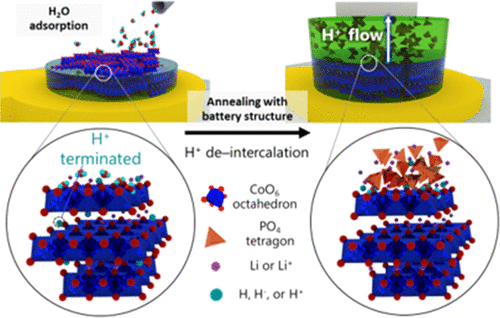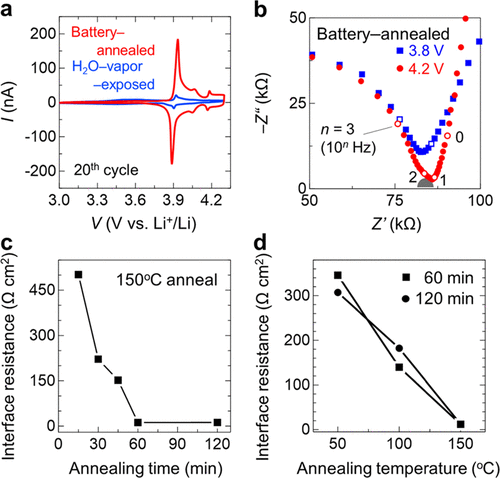

全固态电池:阐明降低性能的因素:Proton 是罪魁祸首
-通过150℃热处理提高性能-
东京工业大学,
东京大学,
国家先进工业科学技术研究院,
山形大学,
该研究小组阐明了降低全固态电池性能的因素之一。
只需热处理
显着改善退化的性能,
我们还成功地开发了新技术。
全固态电池:
-阐明性能下降因素-
常规问题:
全固态电池具有较大的“固体电解质与电极形成的界面电阻”。
因此,问题在于“充电所需的时间比锂离子电池长”。
这个发现:
全固态电池的界面电阻为
发现大气中的水蒸气大大提高了电池性能,降低了电池性能。
通过热处理大大提高了性能:
我们已成功开发出仅通过热处理即可大大改善降低性能的技术。
这是对全固态电池的实际应用有很大贡献的结果。
蓄电及发电设备-Smart Japan
https://www.itmedia.co.jp/smartjapan/articles/2201/11/news057.html
全固态电池性能:热处理大幅提升
-有望应用于电动汽车的电池-
发布日期:2022.01.07
研究要点:
Proton 降低电池性能
全固态电池的电极材料暴露在各种气体中。
结果,从大气和水蒸气侵入电极的质子(氢离子)
已明确这是导致电池性能下降的原因。
150℃热处理提高性能:
其降低的性能是
150℃热处理
已经证明,性能提高到与未暴露在大气中的电池相同的水平。
这种方法大大提高了全固态电池的性能。
东京工业大学新闻 | 东京工业大学
https://www.titech.ac.jp/news/2022/062764
Drastic Reduction of the Solid Electrolyte–Electrode Interface Resistance via Annealing in Battery Form
ACS Applied Materials & Interfaces
Abstract
The origin of electrical resistance at the interface
between the positive electrode and solid electrolyte of an all-solid-state Li battery has not been fully determined.
It is well known that
the interface resistance increases when the electrode surface is exposed to air.However,
an effective method of reducing this resistance has not been developed.This report demonstrates that
drastic reduction of the resistance is achievable by annealing the entire battery cell.Exposing the LiCoO2 positive electrode surface to H2O vapor
increases the resistance by more than 10 times (to greater than 136 Ω cm2).
The magnitude
can be reduced to the initial value (10.3 Ω cm2) by annealing the sample in a battery form.First-principles calculations reveal that
the protons incorporated into the LiCoO2 structure are spontaneously deintercalated during annealing to restore the low-resistance interface.
These results provide fundamental insights into the fabrication of high-performance all-solid-state Li batteries.
ACS Applied Materials & Interfaces